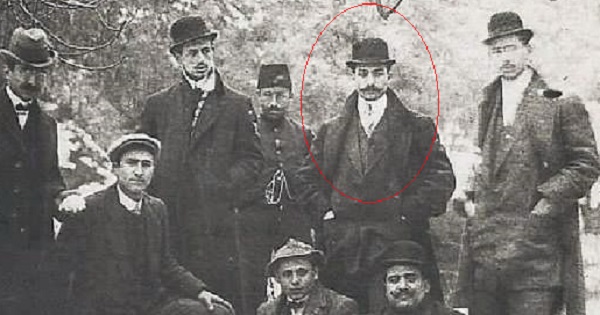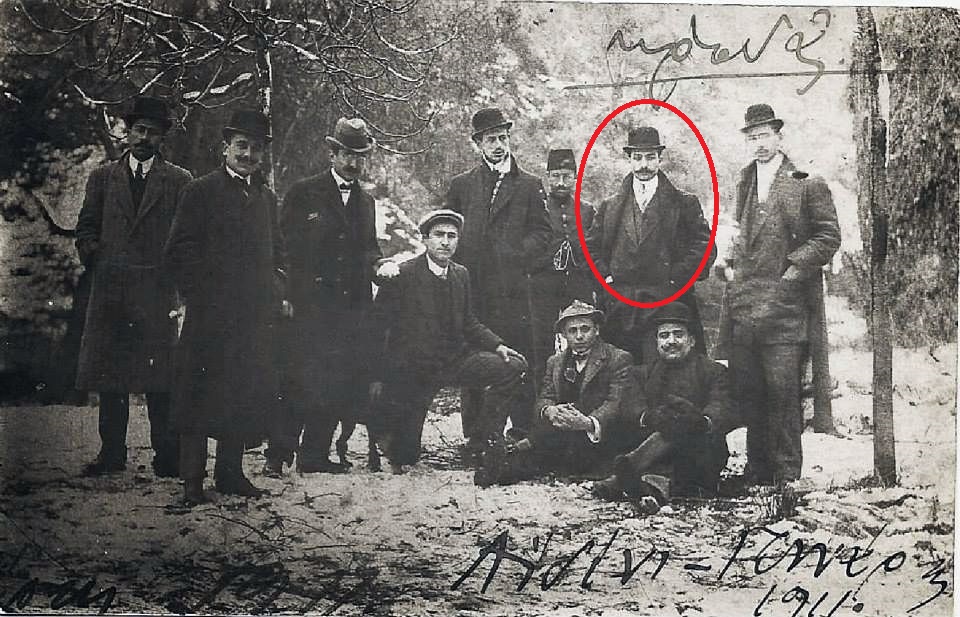
Philoctetes Argyrakis (circled) with a group of Aydin Greeks, Aydin, 1911.
Philoctetes Argyrakis was born in Aydin and was part of a boy scout group that was massacred at Aydin in June 1919. The following testimony was submitted by his grand-daughter via our online questionnaire.
1. From which region of the Ottoman Empire were your ancestors from?:
My paternal grandfather, Philoctetes Argyrakis, was born in Aydin ca. 1885 to Dimitris and Sophia Argyraki. At the time, Aydin, 120 km southeast of Smyrna, was a thriving agricultural and commercial town of 35,000 inhabitants, including 10,000 Greeks. Philoctetes's father, Dimitris, a local merchant, was a landowner and Aydin prelate. Philoctetes became a banker and leader of one of the three newly established Greek boy-scout groups of Aydin, along with Minos Veynoglou and Scout Commissioner Nikolaos Avgeridis. Philoctetes was married to Galatea Ioannides (b. ca. 1900) from Smyrna. They settled in Aydin and had two sons, born in 1917 and 1919.
2. How did their life change when the Neo-Turks and/or the Kemalists came to power?:
The Hellenic Army landed at Smyrna on May 2, 1919, after receiving a mandate by the Allies to establish law and order in the Smyrna zone. On May 14, they marched into Aydin, much to the joy of the pro-Venizelos inhabitants.
The Hellenic Army retreated from Aydin on June 17, fearing an imminent attack by the opposing Turkish forces gathering in the region. The Turkish troops were a combination of regular soldiers and mainly irregular çetes. Adnan, a local man who had tried without success to create a group of Turkish boy scouts in emulation of the Greek groups, headed a section of the çetes.
The town was ravaged for three days by the Turkish forces. Among the massacred were 31 boy scouts, including their three aforementioned leaders. They were captured on June 18 because they had assisted the Hellenic Army and thrown into the Aydin Commander's Office basement without food or water. Foreseeing what was in store for them, they drank the last drop from their flasks in the same manner as Holy Communion.
The following day, the çetes, led by Adnan, marched the prisoners to the banks of the river Evdonas (Tabak Cayi), a small tributary of the Meander (today Büyük Menderes) River. There, they plucked out the eyes of Nicolaos Avgeridis, cut off the head of Minos Veynoglou, and skinned alive Philoctetes Argyrakis because they refused to renounce their faith and Greek ethnicity.
Following that, they tortured, disgraced, and murdered the rest of the 28 young boy scouts in the most despicable manner. As a result, the water of the river turned red. Later, Adnan, the çete leader, took the name Menderes and became the Prime Minister of the Turkish Republic.
3. Were they deported during the genocide? If so, when, where to, and describe their experience:
They were not deported. They were obliged to flee the massacres.
With her two babies, my widowed grandmother, Galatea fled Aydin to her parents, Callirrhoe and Ioannis Ioannides, a well-established olive oil soap manufacturer, in her hometown Smyrna. The babies were named Philoctetes (Jr.) and Minos, in memory of their heroic father and his fellow group leader Veynoglou. Philoctetes Jr. was my uncle, and Minos, my father.
During the Smyrna Catastrophe in August 1922, my grandmother Galatea, the boys, and her parents hid in a cemetery for several days until they found a ship going to Piraeus. During the escapade, Galatea being a beautiful woman, disguised herself as a Turkish woman with a veil and had to part with her jewels when a Turk threatened to cut off her hand.
4. Were they held in a concentration camp or labor camp? If so, where was it located and describe the conditions :
N/A.
5. Did they lose family and friends? If so, how did they cope?
My grandmother Galatea had lost her husband Philoctetes and her sons lost their father.
Arriving in Athens, Galatea with her parents settled in Vyronas, where the children attended elementary school. Later, Galatea remarried, and the family moved to the center of Athens. Under the auspices of writer Penelope Delta, her children Minos and Philoctetes (Jr.) received a scholarship to study at the American College of Psychiko.
Galatea's husband, Mr. Tsohas, an Athenian doctor, died soon after the wedding, and my grandmother became the breadwinner of the family; she began sewing ladies lingerie, mainly brassieres and corsets. She also rented one of her rooms to university students. One of them, a young Cypriot, was to later become the Archbishop Makarios of Cyprus. A lasting friendship bonded them.
Galatea, in her old age, was cared for by the Delta family.
6. Did anyone within Turkey including Turks try to help them during the genocide? :
A Jewish gentleman in Aydin brought my grandmother the remains of her slaughtered husband in a bag.
Also a Turkish caretaker of the Ioannides family helped them collect the valuables necessary to flee Smyrna and later sent them a few household items. I remember a samovar displayed in the living room.
7. How did they cope emotionally with their genocide experience? Did it affect the remainder of their life? :
My grandmother Galatea developed a very strong attachment to her two sons. She was very frugal, almost reticent in sharing her bitter experiences. However, she was always nostalgic about losing a standard of life undreamt of by the Helladic Greeks.
My father, Minos, became a dissident bohemian artist. The tragic legend of a father he never met, the violent deracination, the fear, the images of carnage, flames and fleeing, and the struggle for survival marked him for life.
My uncle Philoctetes (Jr.), a teacher of English, despite managing to build a family and lead a more stable life, was up until his final moments haunted by similar remembrances..
8. Did the denial of the genocide by the perpetrator (the successor state of Turkey) affect their ability to form closure?:
I believe that the concept of closure never entered even a corner of their mind!
9. How did they feel about Turkey after the genocide? :
Until the bitter end, Turkey and the Turks for my paternal family were synonyms with barbarism, devastation, and utter destruction.

Further reading:
The Aydin Massacre: June 1919
20 Mar 1919: Defeated Turk Orders Killing, Washington Herald
22 Aug 1919: Turks Massacre Greek Boy Scouts, Milwaukee Journal
29 Aug 1921: Bodies in City of Death Lie as Turks Left Them, New York Herald



